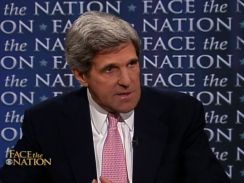 The Obama Administration has been torn over whether to intervene in Libya as leader Muammar Qaddafi continues to violently suppress rebel forces. Senate Foreign Relations Committee chairman John Kerry, D-Mass., today said setting up a controversial no-fly zone over the country would not cross the line into military intervention.
The Obama Administration has been torn over whether to intervene in Libya as leader Muammar Qaddafi continues to violently suppress rebel forces. Senate Foreign Relations Committee chairman John Kerry, D-Mass., today said setting up a controversial no-fly zone over the country would not cross the line into military intervention.
“The last thing we want to think about is any kind of military intervention. And I don’t consider the no-fly zone stepping over that line,” Kerry said on CBS’ “Face the Nation” Sunday.
“We don’t want [U.S.] troops on the ground. [The rebels] don’t want [U.S.] troops on the ground. That would be counterproductive,” Kerry told CBS News chief Washington correspondent Bob Schieffer. But he said that the U.S. ought to be prepared to set up a no-fly zone (although there would be no grounds to implement it until asked by U.S. allies).
A no-fly zone is a territory over which aircraft are not permitted to fly, often set up as a demilitarized zone and enforced by military means.
Senate Minority Leader Mitch McConnell, R-Ky., also said a no-fly zone is worth considering.
But the idea of a no-fly zone is controversial as the Obama administration seems to be of two minds about what to do in Libya – stand by while casualties mount, or aid rebel forces to overthrow Qaddafi?
Schieffer noted that Secretary of Defense Robert Gates has been skeptical of a no-fly zone, saying it is harder to implement than one might think. “[Gates] says basically that’s going to war, because he says if you’re going to have a no-fly zone, you’ve got to go in there and bomb their anti-aircraft installations there, that you’re going to be bombing the country,” Schieffer said.
“That’s actually not the only option for what one could do,” Kerry replied. “One could crater the airports and the runways and leave them incapable of using them for a period of time.” He said a no-fly zone would not amount to war, or even military intervention.
Kerry also noted that it was in the United States’ best interest for Libyan leader Muammar Qaddafi to go. “If Qaddafi stays, there is no question that he will be mischief in the days ahead as he has been in the past,” he said.
In fact, Kerry believes the spirit of reform and rebellion happening across Arab nations is in the strategic national interest of the U.S., especially in the fight against terrorism.
“If we have emerging democracies – people who come out who say to al Qaeda, ‘Look, we didn’t have one suicide bomber, we didn’t have one violent, sort of explosive acts against the West or somebody to make a dramatic statement – we took matters into our own hands with respect to our own government and we have produced change.’
“I think if these countries do reform and they do give a greater voice to their people, and there is greater opportunity – economic opportunity – and people are enfranchised as a result, Bob – that is an enormous consequence to all of us with respect to relationships in the Mideast, to the War on Terror as we have known it and it might be defined in the future,” Kerry said.
Kerry said the Obama Administration has done “a terrific job” in demanding that Qaddafi step down. He believes the leader, who has been in power since a military coup in 1969, is only fighting desperately to cling onto rule, and sooner or later his power will crumble.
“I believe that he’s cornered, but he obviously remains lethal,” Kerry said.
But McConnell was not so sure that Qaddafi’s ouster would benefit U.S. interests.
“I think we need to make sure who we’re dealing with here,” McConnell said. “I’m not sure if it’s our vital interest for him to go. But I think we certainly ought to look for ways to be helpful to those who are seeking to overthrow dictators.”
Qaddafi forces are launching counter attacks today. Although rebel forces have been advancing westward toward the capital, Tripoli, the military retook the town of Bin Jawad, about 110 miles east of Qaddafi’s stronghold city of Sirte.
CBS News correspondent Mark Phillips, who’s in Tripoli, said the situation is at a sort of stale mate at the moment, with neither of the forces able to completely knock the other out. Both sides have claimed victory.
Kerry said there could be a stand-off period for some time. But he believes the opposition is only beginning to gather and collect its strength, and that the stale mate will end.
Neither McConnell nor Kerry want the U.S. to intervene militarily, but Kerry said there are other ways, besides preparing for a no-fly zone, for the U.S. to help.
“I assume that a lot of weapons are going to find their way there from one means or another over the course of the next week.” Kerry said. CBS

Leave a Reply
You must be logged in to post a comment.